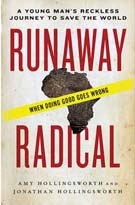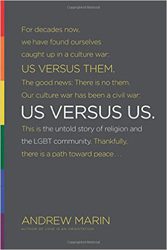 Amy and Jonathan Holligsworth’s Runaway Radical is a disturbing text. I was angry as I read about how religious leaders destroyed a young man’s spiritual idealism by manipulation, authoritarianism, and absolutism. As I prepare for next week’s sermon, I’ve been reading the story of Thomas the disciple. Thomas gets a bad rap for his willingness to doubt the resurrection until he can encounter the risen Jesus. Thomas is seen as the doubter and the skeptic, and is compared unfavorably with those who believe without question.
Amy and Jonathan Holligsworth’s Runaway Radical is a disturbing text. I was angry as I read about how religious leaders destroyed a young man’s spiritual idealism by manipulation, authoritarianism, and absolutism. As I prepare for next week’s sermon, I’ve been reading the story of Thomas the disciple. Thomas gets a bad rap for his willingness to doubt the resurrection until he can encounter the risen Jesus. Thomas is seen as the doubter and the skeptic, and is compared unfavorably with those who believe without question.
Yet Thomas is a hero of faith, and Thomas-like faith is an antidote to the religious abuses described in Runaway Radical. Theologian Paul Tillich asserted that doubt is an essential aspect of faith. Doubt is a sign of how seriously we take our faith and not a willful disregard of doctrine and religious authority.
Scripture asserts that when it comes to our rituals, practices, and doctrines, “we have this treasure in clay jars, so that it may be made clear that this extraordinary power belongs to God and does not come from us.” (2 Corinthians 4:7) Only God is absolute. Our understandings of God are finite, limited, relative, and perspectival in nature. We can make claims about our faith, and be willing to sacrifice for what we believe; we must also be willing to recognize that no description or institution fully represents God. There is no room for infallibility or absolute authority in our understanding of religious leadership. Question and self-criticism are the heart of a healthy faith.
Jonathan Hollingsworth sought to be faithful to God. His religious authorities were not faithful to him. Their authoritarianism placed doctrine ahead of rendering unto God’s vision of wholeness. Their leadership was a form of religious and spiritual abuse, leading to post-traumatic stress in this young man.
Jesus loved the idealism of young people and the liveliness of children. He believed that the realm of God was alive and free, unbounded by legalisms of all kinds. Jesus warned that those who harmed the innocence and idealism of children were subject to divine judgment.
This is a book about idealism, religious abuse, trauma, and the hope of healing. Too many young people have left the church as the result of trauma and authoritarianism. Our faith needs healing and the affirmation of a God who is still speaking, who is constantly challenging our religious pretentions, and who welcomes questions as well as answers. May Jonathan and his family experience the healing presence of our savior who is known, even after the resurrection, by the wounds in his side and his healing touch. That is my prayer.












